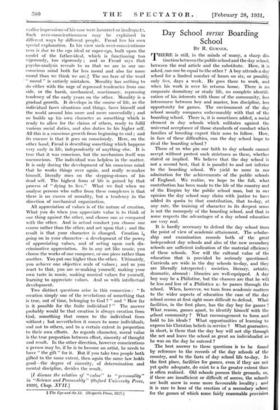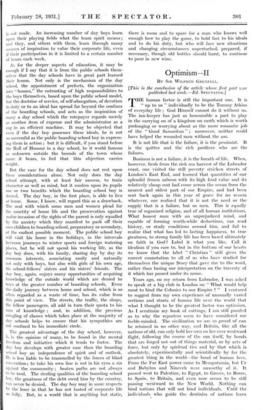Day School versus Boarding School BY R. GURNER. T HERE is
still, in the minds of many, a sharp dis- tinction between the public school and the day school, between the real article and the substitute. How, it is asked, can one be equal to the other ? A boy attends a day school for a limited number of hours on six, or possibly only five, days a week. He goes there to work, and when his work is over lie. returns home. There is no corporate dormitory or study life, no complete identifi- cation of his interests with those of the community, less intercourse between boy and master, less discipline, less opportunity for games. The environment of the day school usually compares unfavourably with that of the boarding school. There is, it is sometimes added, a social element in day schools which militates against the universal acceptance of those standards of conduct which families of breeding expect their sons to follow. How, in face of these difficulties, can the day school hope to rival the boarding school ?
Those of us who pin our faith to day schools cannot accept without protest such strictures as these, whether stated or implied. We believe that the day school is not a second best, that it is parallel to and not inferior to the boarding school. We yield to none in our admiration for the achievements of the public schools of England. We realize, we hope to the full, what contribution has been made to the life of the country and of the Empire by the public school man, but in our opinion the day school may claim with justice to have added its quota to that contribution, that to-day, at any rate, the training of character in its deepest sense is not the monopoly of the boarding school, and that in some respects the advantages of a day school education are very real.
It is hardly necessary to defend the day school from the point of view of academic attainment. The scholar- ship and examination records both of the great independent day schools and also of the new secondary schools are sufficient indication of the material efficiency of these schools. Nor will the cultural value of the education that is provided be seriously questioned. Curricula are wide in the day schools to-day, and they are liberally interpreted : societies, literary, artistic, dramatic, abound : libraries are well-equipped. A day boy may be a Philistine, but the chances are that he will be less and less of a Philistine a3 he passes through the school. When, however, we turn from academic matters to the wider aspects of education the case of the day school seems at first sight more difficult to defend. What facilities, in the first place, has the day boy for games ? What reason, games apart, to identify himself with the school community ? What encouragement to form and hold to his ideals ? What opportunities of learning to express his Christian beliefs in service ? What guarantee, in short, is there that the day boy will not slip through the net and leave the school as great an individualist as he was on the day he entered ?
The best answer to these questions is to be found by reference to the records of the day schools of the country, and to the facts of day school life to-day. In the first place, facilities for games, even if they are not yet quite adequate, do exist to a far greater extent than is often realized. Old schools possess their grounds, or, if these are insufficient or difficult of access, the schools are built anew in some more favourable locality ; and it is rare to hear of the erection of a secondary school for the games of which some fairly reasonable provision. is not made. An increasing number of day boys learn upon their playing fields what the team spirit means ; and they, and others with them, learn through many sources of inspiration to value their corporate life, even if their participation in it is limited to a certain number of hours each week.
As for the deeper aspects of education, it may be enough if I say that it is from the public schools them- selves that the day schools have in great part learned their lesson. Not only is the mechanism of the day school, the appointment of prefects, the organization into "houses," the entrusting of high responsibilities to the boys themselves, based upon the public school model, but the doctrine of service, of self-abnegation, of devotion to duty or to an ideal has spread far beyond the confines of the boarding schools, and acts as the inspiration of many a day school whieh the ratepayer regards merely as another item of expense and the administrator as a cog in an efficient machine. It may be objected that even if the day boy possesses these ideals, he is not so successful as the public boarding school boy in express- ing them in action ; but it is difficult, if you stand before the Roll of Honour in a day school, be it world famous or unknown outside the bounds of the town whose name it bears, to feel that this objection carries weight.
But the case for the day school does not rest upon these considerations alone. Not only does the day school attempt, with at least fair success, to train character as well as mind, but it confers upon its pupils one or two benefits which the boarding school boy is denied. The day boy, in the first place, is able to live at home. Some, I know, will regard this as a drawback. The zeal with which some men and women plead for the sanctity of home life and the preservation against undue invasion of the rights of the parent is only equalled by the anxiety which they manifest to pack off their own children to boarding school, preparatory or secondary, at the earliest possible moment. The public school boy will visit his home in the holidays, in the intervals between journeys to winter sports and foreign watering places, but he will not spend his working life, as the day boy does, with his family, sharing day by day its common interests, associating easily and naturally not only with boys, but also with girls of his own age, his school-fellows' sisters and his sisters' friends. The day boy, again, enjoys many opportunities of acquiring knowledge of the outside world which are denied to boys at the greater number of boarding schools. Even the daily journey between home and school, which is so often regarded as a waste of time, has its value from this point of view. The streets, the traffic, the shops, the fellow passengers, all add in turn their quota to his sum of knowledge ; and, in addition, the precious mingling of classes which takes place at the majority of day schools helps to ensure that his sympathies are not confined to his immediate circle.
The greatest advantage of the day school, however, is, in the opinion of many, to be found in the mental freedom and initiative which it tends to foster. The day boy develops with greater ease than the boarding school boy an independence of spirit and of outlook. Ile is less liable to be trammelled by the forces of blind convention ; to take his own line is not in his eyes a sin against the community ; beaten paths are not always to be trod. The sterling qualities of the boarding school boy, the greatness of the debt owed him by the country, can never be denied. The day boy may in some respects he the loser in that he has not tasted of corporate life SO fully. But, in a world that is anything but static, there is room and to spare for a man who knows well enough how to play the game, to hold fast to his ideals and to do his duty, but who will face new situations and changing circumstances unperturbed, prepared, if necessary, though old bottles should burst, to continue to pour in new wine.












































 Previous page
Previous page